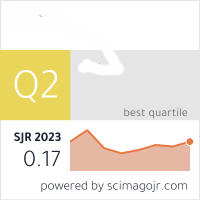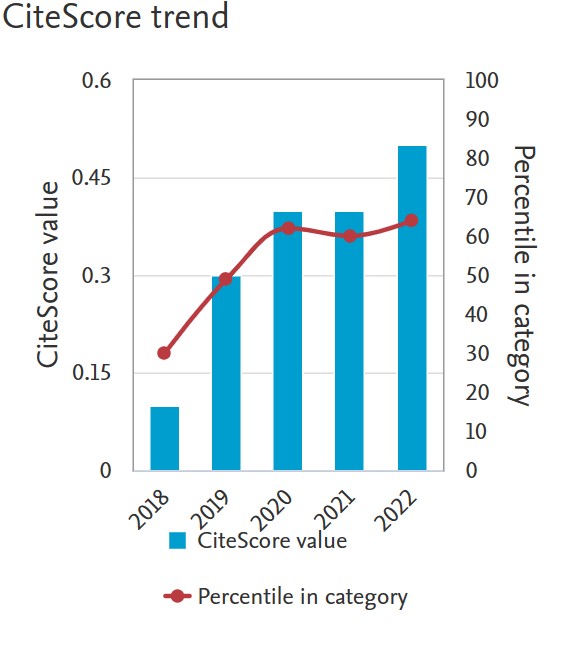Assessment of Parents' Psychological Distress and its Coping Strategies Related to Children with Hereditary Blood Disease
Keywords:
Parents', Distress, Coping, Blood DiseaseAbstract
Parents receive twice what their child gets if gets sick, so how about if the disease is a genetic blood disease. Parents who have an affected child will suffer as their child suffers, and perhaps more than him, because this disease may lead to the death of their child (1). Objective: the study aim to assess parents' psychological distress and coping strategies related to children with inherited blood disease. Methods: A Descriptive study design to assess the parents' psychological distress and its coping strategies related to children with hereditary blood diseases. Had been applied during the period 28 ͭͪFebruary 2022 to 3 ͭ ͪ December 2022. Non-probability (purposive) sample of (60) Parents were chosen from the Al-Zahra Teaching Hospital for Maternity and Children's in Thalassemia Center. (22 fathers and 38 mothers). The questionnaire used are the Parental Stress Scale (PSS) to assess the psychological distress and coping strategies were assessed by the brief cope. Results: 96.6% of parents try to be reassured in their religion or spiritual beliefs and always adapt to them. And 92% of parents always pray and hope. 36.7% of parents feel tired without a valid reason during the past thirty days. 40% of parents feel all the time that everything is stressful (effortless). There is a statistical significant relationship between parents’ coping strategies with regard to their gender, residency. There is a statistical significant relationship between parents’ psychological distresses with regard to their educational level, occupation, monthly income. Conclusion: The majority of parents try to be reassured in their religion or spiritual beliefs and always adapt to them, due to our cultural attribute as Muslim can help individuals intolerance life stress. And most of parents always praying or meditating. Parents always receive emotional support. And most of parents focus their efforts on doing something about the subject they are always.
Downloads
References
Atshan, R. S., & Aziz, A. R. (2022).
Effectiveness of an Educational Program
on Parents' Knowledge about Home
Health Care Management to Children
with Beta Thalassemia-Major at
Thalassemia Center in Al-Zahra Teaching
Hospital for Maternity and Children in AlNajaf City. Pakistan Journal of Medical &
Health Sciences, 16(03), 931-931.
Ali, S., Sabih, F., Jehan, S., Anwar, M., &
Javed, S. (2012). Psychological distress and
coping strategies among parents of betathalassemia major patients. In International
Conference on Clean and Green Energy
(Vol. 27, No. 2012, pp. 124-8).
Carlsson, T., Kukkola, L., Ljungman, L.,
Hovén, E., & von Essen, L. (2019).
Psychological distress in parents of
children treated for cancer: An explorative
study. PloS one, 14(6), e0218860.
Kukkola L, Hovén E, Cernvall M, von Essen
L, Grönqvist H. Perceptions of support
among Swedish parents of children after
end of successful cancer treatment: a
prospective, longitudinal study. Acta
Oncol. 2017;56: 1705–1711.
Ljungman L*, Hovén E*, Ljungman G,
Cernvall M, von Essen L. Does time heal
all wounds? A longitudinal study of the
development of posttraumatic stress
symptoms in parents of survivors of
childhood cancer and bereaved parents.
Psychooncology. 2015; 24: 1792–1798.
Psychological distress Questionnaire-10
(PDQ-10). (Kessler, et al. 2002)
Kessler, R.C., Andrews, G., Colpe, .et al
(2002) Short screening scales to monitor
population prevalence and trends in nonspecific psychological distress.
Psychological Medicine, 32, 959-956.
Carver, C. S. (1997). You want to measure
coping but your protocol 'too long: Consider
the brief cope. International journal of
behavioral medicine, 4(1), 92-100.
Knekta, E., Runyon, C., & Eddy, S. (2019).
One Size Doesn’t Fit All: Using Factor
Analysis to Gather Validity Evidence
When Using Surveys in Your Research.
CBE—Life Sciences Education, 1–17.
Bolarinwa, O. (2015). Principles and methods of
validity and reliability testing of
questionnaires used in social and health
science researches. Nigerian Postgraduate
Medical Journal, 195-201.
Anderson, D. R. (2016). Statistics for business &
economics. Boston: Cengage Learning.
Merriam-webster, E. M. (2016). Merriamwebsters Spanish English Dictionary. us:
Merriam Webster.
Bougioukas, K. I. (2019). Medical Biostatistics:
Basic Concepts. Cham: Springer.
Ali , Z., & Bhaskar, S. B. (2016). Basic statistical
tools in research and data analysis. Indian
journal of anaesthesia, 662–669.
Choi, M. S., & Shin, H. (2015). Reliability
and Validity of the Menopausal Symptom
Scale. Women & Health, 58-76.
Plonsky, L., & Oswald, F. L. (2017). Multiple
regression as a flexible alternative to
ANOVA in L2 research. Studies in Second Language Acquisition, 39(3), 579-592
Mishra, P., Singh, U., Pandey, C. M., Mishra, P., &
Pandey, G. (2019). Application of Student's ttest, Analysis of Variance, and Covariance.
Annals of Cardiac Anaesthesia, 407–411.
Karaca, A., & Konuk Şener, D. (2021).
Spirituality as a coping method for mothers
of children with developmental disabilities.
International Journal of Developmental
Disabilities, 67(2), 112-120.
Abdulameer, A. B., & Al-Dujaili, A. H. (2021).
Psychological Distress among Caregivers of
Children with Down Syndrome at Al Najaf
Province. Indian Journal of Forensic
Medicine & Toxicology, 15(4).
Bioku, A. A., Ohaeri, J. U., Oluwaniyi, S. O.,
Olagunju, T. O., Chaimowitz, G. A., &
Olagunju, A. T. (2021). Emotional distress
among parent caregivers of adolescents with
sickle cell disease: Association with patients
and caregivers variables. Journal of Health
Psychology, 26(14), 2851-2860.
Othman, A., Ghani, M. S. A. A., Taib, F., &
Mohamad, N. (2022). Psychological
distress and coping strategies among the
caretakers of children with transfusiondependent thalassemia. Frontiers in
Pediatrics, 10
Downloads
Published
Issue
Section
License
You are free to:
- Share — copy and redistribute the material in any medium or format for any purpose, even commercially.
- Adapt — remix, transform, and build upon the material for any purpose, even commercially.
- The licensor cannot revoke these freedoms as long as you follow the license terms.
Under the following terms:
- Attribution — You must give appropriate credit , provide a link to the license, and indicate if changes were made . You may do so in any reasonable manner, but not in any way that suggests the licensor endorses you or your use.
- No additional restrictions — You may not apply legal terms or technological measures that legally restrict others from doing anything the license permits.
Notices:
You do not have to comply with the license for elements of the material in the public domain or where your use is permitted by an applicable exception or limitation .
No warranties are given. The license may not give you all of the permissions necessary for your intended use. For example, other rights such as publicity, privacy, or moral rights may limit how you use the material.











